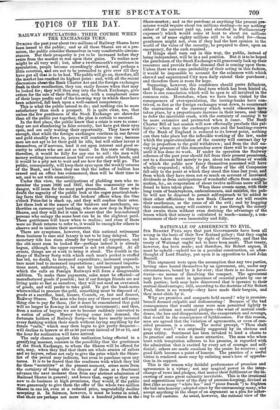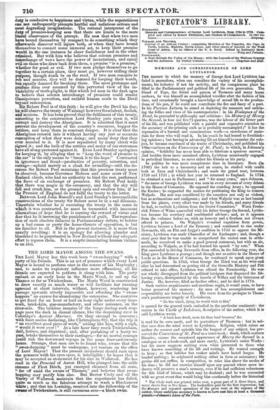RATIONALE OF ADHERENCE TO EVIL.
SIR ROBERT PEEL says that past Governments have been all wrong in the basis of their New Zealand policy; that they ought to have taken the country by right of discovery, and that the treaty of Waitangi ought not to have been made. That treaty, however, has been made ; and therefore, Sir Robert argues, it must be upheld—upheld too in a peculiar construction, an after- thought of Lord Stanley, put upon it in opposition to Lord John Russell.
This argument rests upon the assumption that any two parties,
having once bound themselves by an agreements are, under any circumstances, bound by it for ever; that there is no locus pent. tentie—no means of dissolving the compact. The agreement may have been made in ignorance of essential points by one or both parties ; both may have discovered that it operates to their mutual disadvantage; still, according to the doctrine of Sir Robert Peel, there is no remedy—they have made their bargain, and they must abide by it.
Why are promises and compacts held sacred ? why is promise-
breach deemed culpable and dishonouring ? Because of the bad consequences that would ensue were men permitted lightly to rescind solemn and mutual pledges—the want of mutual confi- dence, the loss and disappointment, the exasperation and revenge, that would be the consequence of faithlessness. For this reason, men are agreed that the violation of agreements, or even of one- sided promises, is a crime. The moral precept, "Thou shalt keep thy word," was originally suggested by its obvious and Feat utility. Sentiment has been invoked to lend a charm to its practice and render it more attractive. The man who when beset with temptation adheres to his promise, is regarded with the admiration that is excited by every act of courage and self- denial ; others are made emulous by the praise he receives ; and good faith becomes a point of honour. The practice of a useful virtue is rendered more easy by enlisting men's love of approba- tion in its support. This is the reason why faithful performance of promises and agreements is a virtue; not any magical power in the inter- change et' vows intd pledges, that makes their fulfilment or the in- curring of some great calamity inevitable. This is the irrational and superstitious view of the duty of promise-keeping, devised at first (like so many "white lies" and "pious frauds ") to frighten the bad into honesty; adopted since by the unreasoning many, who accept anything in the shape of an argument as a plea for adher- ing to old customs. As usual, however, the rational view of the duty is conducive to happiness and. virtue while the superstitious one not unfreque,ntlyprompts hurtful and nefarious actions and most degrading imaignations. The rational interpreter of the duty of promme-keepum; sees that. there are limits to the mere literal observance of the precept. He sees that when two men have bound themselves by compact to do something which they afterwards discover will uqure -both, or when they have bound themselves to commit some immoral act, to keep their promise would in the one instance be sheer foolishness and in the other criminal But with him who believes that solemn promises and interchange of vows have the power of incantations, and. entail evil on those who draw back from them, a promise "is a promise," whether for good or evil. If two men pledge themselves to go together to a certain place, they must go, however trifling their purpose' though death be on the road. If two men conspire to rob and murder, they will be damned for keeping their words, but equally damned for breaking them. The most grotesque and profane form ever assumed by this perverted view of the in- violability of troth-plight, is that which led men in the dark ages to believe that solemn interchange of promises could render Omnipotence powerless, and enthral human souls to the Devil beyond redemption. Sir Robert Peel is of this faith : he will give the Devil his due; he will observe the treaty of Waitangi however fraudulent, foolish, and noxious. It has been proved that the fulfilment of this treaty, according to the construction Lord Stanley puts upon it, will corrupt and destroy the Aborigines. It is admitted that it must prevent the development of the country's resources, beggar the settlers, and keep them in constant danger. It is clear that the Aborigines entered into it without having any just or accurate conception of what they were doing; and many deny that they ever acceded to it. It is now repudiated by many chiefs who signed it ; and the bulk of the settlers and many of our statesmen have all along protested against it. Even Lord Stanley apologizes for keeping it, by alleging that to "keep the word of promise to the ear" is the only means to "break it to the hope." Contracted in ignorance and fraud—productive of poverty, extortion, and outrage—upheld merely as a cloak for swindling—still the de- ceroua Sir Robert Peel maintains that this precious treaty- must be observed, because Governor Hobson and some score of New Zealand chiefs, who had no authority to bind the rest, performed the farce of an exchange of promises. Sir Robert Peel holds that there was magic in the ceremony, and that the sky -will fall and crush him, or the ground open and swallow him, if he the Premier of England do not fulfil the treaty to the letter. Between Lord. John Russell's and Lord Stanley's irreconcilable constructions of the treaty Sir Robert must be in a sad. dilemma. Uncertain whether he is executing the treaty- in the sense in w2zic4 it was contracted, he must be tormented with incessant alternations, of hope that he is earning the reward of virtue and fear that he iinctrrring the punishment of guilt. The reproduc- tion of such obsolete fallacies in Parliamentary debate, to bolster up a bad cause or parry the home-thrusts of opposition, is but tea familiar to all. But in the present instance, it is more than usually revolting: it is an apology for allowing plunder and bloodshed to be perpetuated in New Zealand without any adequate effort to repress them. It is a sceptic immolating human victims to an idol



























 Previous page
Previous page